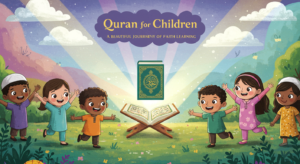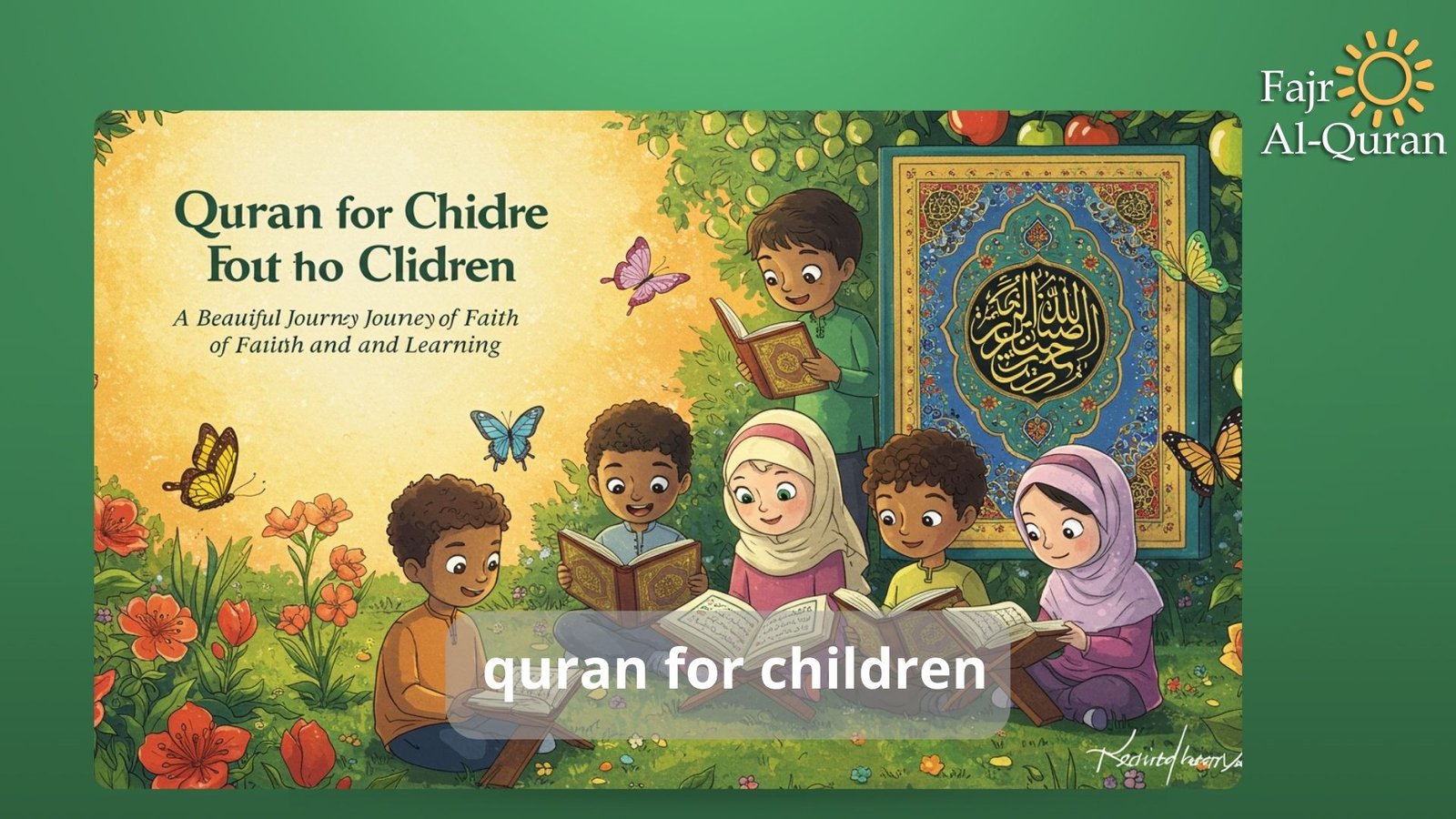Introducing children to the Quran at an early age lays the foundation for a life of faith, morality, and wisdom. “Quran for children” is more than just a phrase—it’s a mission, a goal, and a sacred responsibility for every parent, teacher, and caregiver in the Muslim community. It is the starting point of a spiritual journey that connects young hearts with their Creator and anchors them in the values of Islam from the earliest moments of consciousness.
When we focus on Quran for children, we’re not just talking about memorization or recitation—we are nurturing a generation that understands, reflects, and embodies the divine guidance in their daily lives.

The Importance of Introducing the Quran to Children
Children are naturally curious and open to learning. Their hearts are pure, making them ideal vessels for absorbing the light of the Quran. Teaching the Quran to children is one of the most significant gifts a parent can give. It embeds spiritual values early and forms a strong connection with Allah (SWT) that can protect them throughout life.
The Quran for children acts as a moral framework. It teaches respect for others, compassion for the weak, and responsibility for one’s actions. Children exposed to Quranic teachings develop empathy, gratitude, patience, and resilience. These aren’t just Islamic values—they’re essential life skills that shape confident, well-rounded individuals.
Moreover, introducing the Quran early means that its verses become companions through the child’s stages of growth. The wisdom of the Quran then becomes a reference point for their decisions, behavior, and mindset.
How to Make Learning Quran Fun and Engaging for Kids
While the Quran is a sacred text, the process of teaching it to children doesn’t have to be rigid or overly formal. In fact, the most effective approach to Quran for children is one that is joyful, playful, and interactive. Here are some strategies to keep young learners excited and motivated:
- Interactive digital tools: Apps that gamify Quranic learning with rewards, characters, and story paths. These digital platforms make it easier to keep kids engaged without compromising content quality.
- Colorful visuals and flashcards: Visual memory aids are incredibly effective for children. Use cards with Arabic letters, vocabulary, and images from Quranic stories.
- Creative storytelling: Bring stories of the Prophets to life through puppets, dramatization, or roleplay. Ask kids to retell the story in their own words.
- Craft and activity-based learning: Let children draw their favorite Quranic story, build a Kaaba model, or create their dua book.
- Positive reinforcement: Celebrate effort, not just achievement. Praise children even when they struggle. This builds a healthy association with learning.
Making Quran for children enjoyable doesn’t dilute its value—it strengthens it by building positive emotional associations with the Book of Allah.
Benefits of Teaching the Quran to Children
The long-term rewards of focusing on Quran for children are immense, both spiritually and practically. Here are just some of the countless benefits:
- Early spiritual connection: Children feel closer to Allah and are more likely to turn to Him in times of need or confusion.
- Moral foundation: Kids develop strong ethics and decision-making guided by Islamic principles.
- Memory enhancement: Memorizing surahs sharpens cognitive ability, improves concentration, and enhances brain development.
- Better Arabic language skills: Exposure to Quranic Arabic improves vocabulary, pronunciation, and comprehension.
- Cultural awareness and identity: Children understand where they come from, and feel a deep bond with the global Muslim ummah.
- Confidence and public speaking: Reciting in front of others builds communication skills and courage.
- Stronger family relationships: Quran sessions become quality bonding time with parents and siblings.
- A lifelong source of comfort: As children grow, they will turn to the Quran in both joy and hardship for guidance and peace.
The impact of Quran for children isn’t just spiritual—it affects every area of development.
Choosing the Right Quran Learning Program
With so many options available today, finding the right Quran for children program can be overwhelming. Here’s what to look for when selecting a course or tutor:
- Experienced teachers with child-friendly approaches
- Balanced focus on tajweed, understanding, and memorization
- Curriculum tailored to different age groups and learning styles
- Encouragement of understanding over rote learning
- Safe, supportive, and distraction-free environment
- Flexible schedules to match the child’s routine
A strong Quran program for children is one that creates excitement, not fear. It should inspire questions, ignite curiosity, and build confidence.
Many online platforms have made this easier than ever. Children can now connect with qualified teachers from around the world from the comfort of their homes.
Best Practices for Teaching Quran to Kids
1. Start Early, Go Slowly
Introduce basic Islamic phrases and short duas from toddlerhood. As children grow, move to letters, surahs, and eventually tajweed. Keep expectations realistic—consistency matters more than speed.
2. Make it a Family Affair
Let Quran recitation be a part of the home environment. Play recitations during meals or car rides. Have weekly family Quran circles where each person shares something they learned.
3. Let Curiosity Lead
Encourage questions like “Why did Prophet Nuh build an ark?” or “What does this surah mean?” This promotes deeper learning and a personal relationship with the Quran.
4. Emphasize Understanding
Instead of pushing only memorization, explain meanings and morals in age-appropriate language. Children are more likely to remember what they understand.
5. Celebrate Every Achievement
Whether it’s mastering a new letter or reciting a full surah, mark it with encouragement, hugs, or small gifts. Quran for children becomes more special when celebrated with joy.
Common Challenges and How to Overcome Them
Short Attention Spans
Switch between different activities—some days focus on recitation, other days on stories or games. Keeping it dynamic helps retain interest.
Lack of Motivation
Find out what excites your child and link it to their Quran journey. If they love art, let them illustrate a surah. If they like music, teach surahs with rhythmic melodies.
Inconsistent Learning
Build a daily habit, even if it’s just 10 minutes. Small consistent steps are more effective than long, irregular sessions.
Finding Good Teachers
If you can’t find local instructors, opt for online Quran classes for children. Platforms like FajralQuran provide qualified tutors who specialize in teaching young learners in an engaging way.
Conclusion
Guiding our children toward the Quran is one of the greatest investments we can make. The path of Quran for children is one filled with meaning, joy, growth, and divine blessings. Whether through memorization, understanding, or reflection, every small step brings a child closer to Allah and His guidance.
Don’t wait for the perfect moment—start now. Even a little effort today can change your child’s entire future.
Start your child’s Quran journey today. Subscribe now to FajralQuran—a trusted platform offering structured, child-centered Quran learning experiences tailored for today’s young Muslims, helping make Quran for children not just possible, but powerful.
Read also about Why Teaching Quran Remotely Is Changing Lives Worldwide


